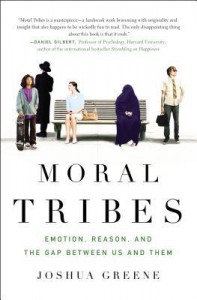Moral Tribes: Emotion, Reason, and the Gap Between Us and Them
 Even though almost all of the books and science experiments cited within the text I have heard elsewhere through other Audible books and lectures, I still found this book edifying since the author, a philosopher, knows how to explain complicated science better than most science writers by explaining complex thoughts into easy digestible pieces and can tie the story together with an overriding narrative.
Even though almost all of the books and science experiments cited within the text I have heard elsewhere through other Audible books and lectures, I still found this book edifying since the author, a philosopher, knows how to explain complicated science better than most science writers by explaining complex thoughts into easy digestible pieces and can tie the story together with an overriding narrative.All knowledge about our place in the universe goes from the particular to the group and the group to the population. As for the development of our moral understanding the author argues similarly our moral understanding goes from "the me" to "the us" and "the us" to "the other". Homo Sapiens developed a method to get us out of our pure solipsism by allowing us to understand there is an advantage in cooperation within our closest group and that there will be competition between the us and the them.
The author's main thesis in the book is defending Utilitarian philosophy (or as he sometimes calls it deep pragmatism), a system of philosophy which starts with the premise the overall happiness should be maximized. He uses the 'trolley problem' and breaks it down and shows how some of our brain states correlate with his thesis of 'automatic mode' verse 'manual mode', intuition v. reason.
I'm in the minority in the trolley problem. I never would have turned the switch in the first version, and I definitely would not drop the man onto the tracks to save lives in the second version. That made some of the givens the author gives not so clear cut for me.
Overall I am an Utilitarian (after all I'm in general for anything which Ayn Rand despised as much as she did Utilitarianism), but the author really doesn't end the argument. Ultimately he's begging the question in how he defines happiness. I think that almost everyone thinks that their belief system leads to the greatest happiness overall. We always rationalize (at least I do) our beliefs that way. Adolph Hitler rationalized his acts and claimed that the world would thank him for what he did. It's the rare person who wants to create harm overall just for the sake of creating harm. We always rationalize and fill in the blanks within our own mind (the author will even say that in the text and cite some research that supports that).
This book is a real find for anyone who hasn't read much in this field. He links all the science with multiple philosophies and gives a great narrative like a good philosopher should. I think the author always tries to be fair when he dances around political differences. But, he did one thing that really irritated me. He calls those who deny the truth about climate change "climate skeptics'. That's just a misuse of the word 'skeptic'. Skeptics will keep an open mind and look at the data and the story that abduction (inference to the best explanation) tells. People who don't accept climate change do not deserve the respect the word 'skeptic' connotes.
In summary, the book is a very good book, well explained, good science and provides a good way to think about morality through the lens of Jeremy Bentham and John Stuart Mills. I don't think he proves utilitarianism is the ultimate philosophy but he gives good arguments while it might be the best overall.







